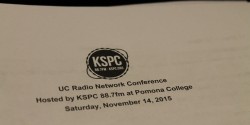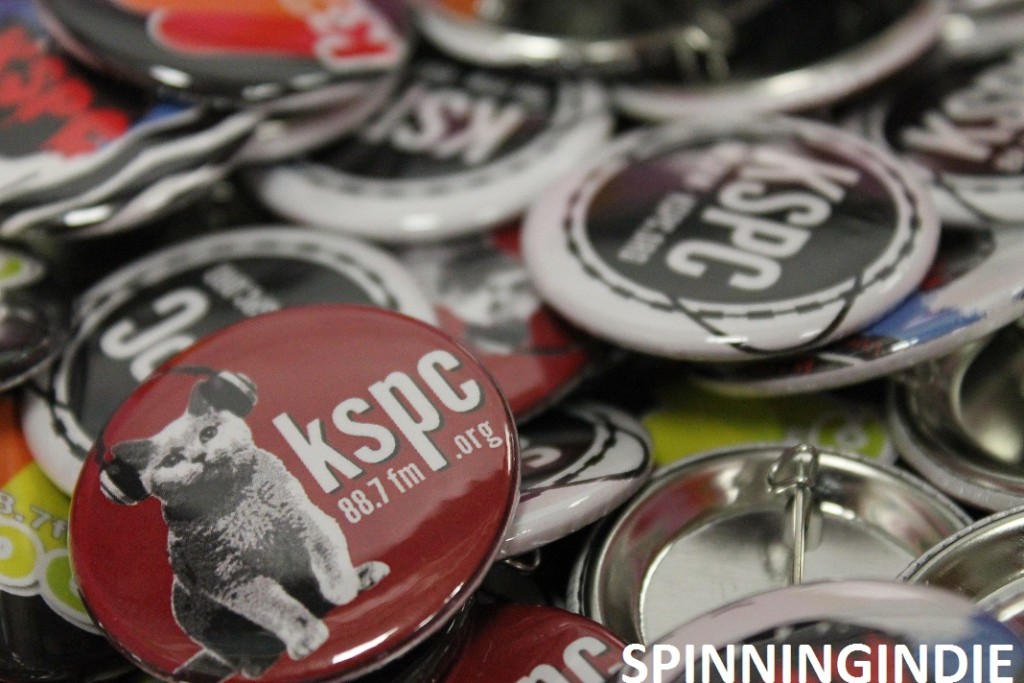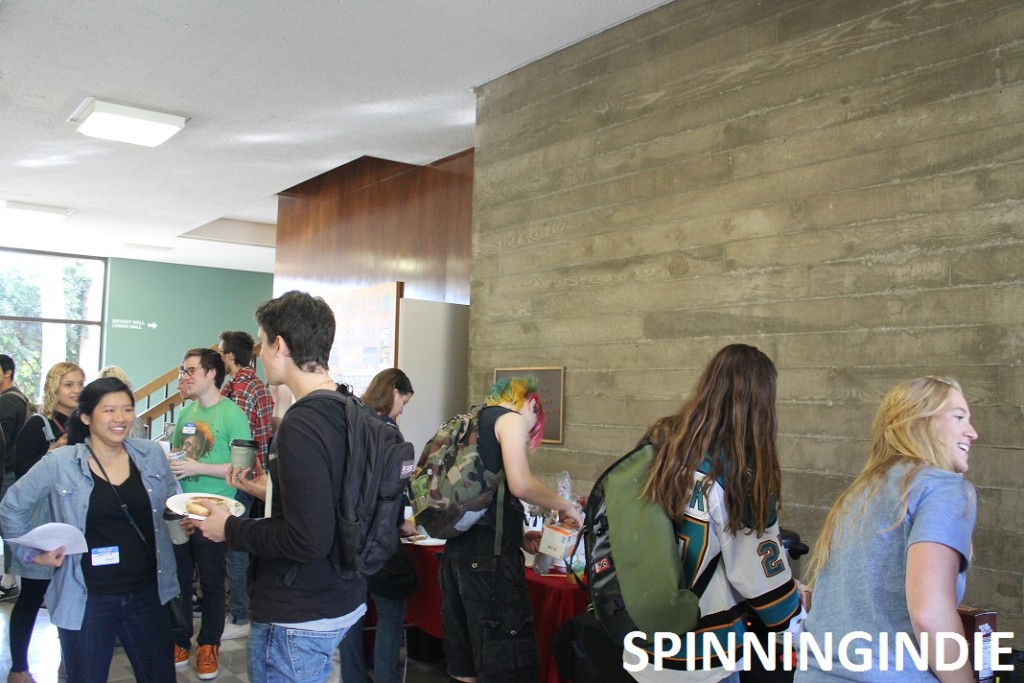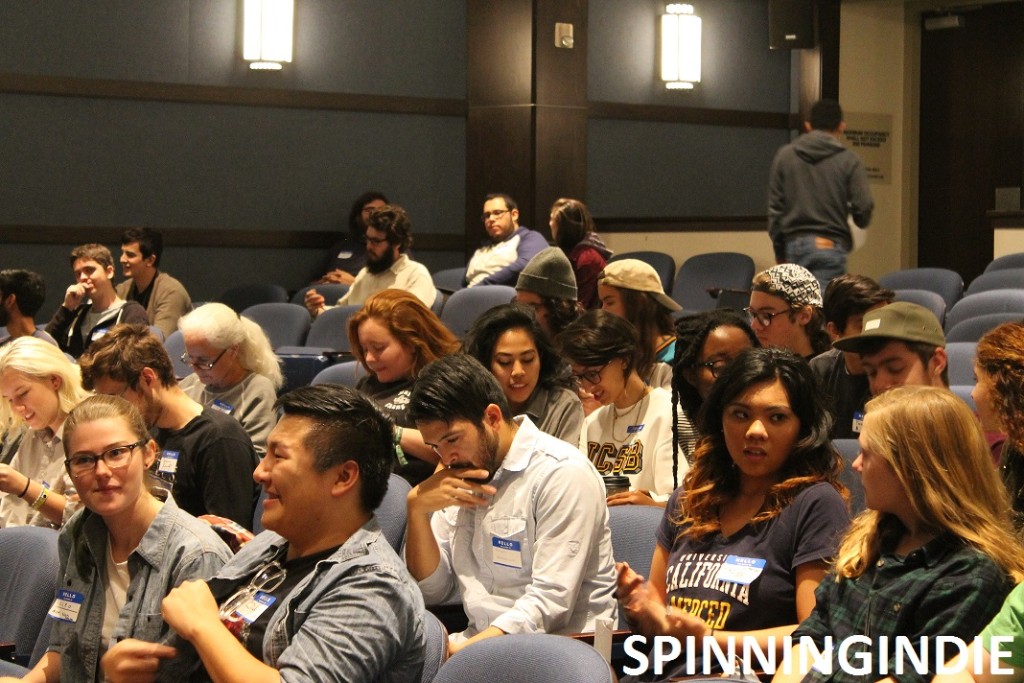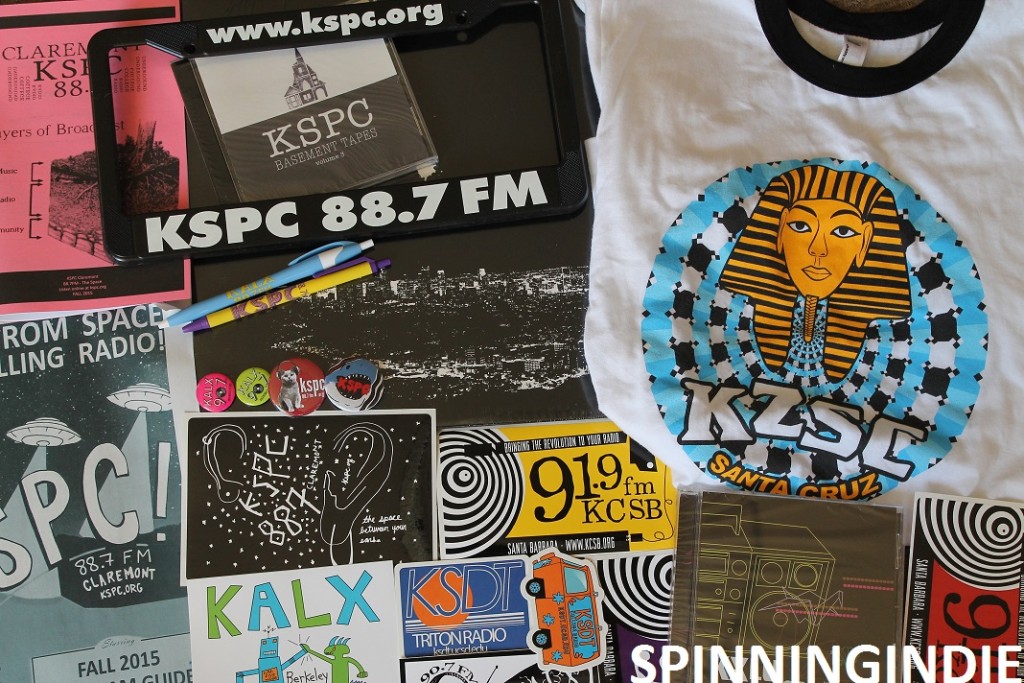On Saturday, I headed to KSPC-FM at Pomona College in Claremont, California (my station tour report is coming soon!) for the Fall 2015 UCRN (University of California Radio Network) conference. Staff, DJs, and volunteers from approximately a dozen radio stations from all over California met up to share experiences and tips with their college radio colleagues.
For me, it was also a great opportunity to revisit KSPC, a station where I had been a DJ and volunteer in the late 1990s. Although I’d been back three years ago for a UCRN event, I have such fond memories of KSPC, that it’s always a treat to come back.
UCRN conferences are a long-time tradition and typically take place twice a year at a different California college radio station, often alternating between Northern and Southern California from semester to semester. Stations volunteer to host the conferences, which are free to attendees.
A loose-knit organization (there are no membership fees), UCRN is primarily comprised of stations at University of California schools, although the group has opened up its conferences to other California-based college radio stations as well. Stations in attendance at the November 14 event included University of California (UC) stations from Berkeley (KALX), Santa Cruz (KZSC), Santa Barbara (KCSB), Merced (BobcatRadio), Irvine (KUCI), Los Angeles (UCLARadio), and San Diego (KSDT) as well as the following non-UC stations: KSPC (Pomona College), KFJC (Foothill College), KXLU (Loyola Marymount University), and KXSC (University of Southern California).
Day Begins with Mingling, KSPC Tour and Town Hall
The day began with a casual breakfast of bagels and coffee in the lobby of the Thatcher Music Building at Pomona College. Attendees mingled and were invited to head downstairs to tour KSPC’s basement digs. Following that, there was a Town Hall Meeting, during which KSPC’s Station Director Erica Tyron welcomed the participating stations. She gave a bit of an overview about UCRN, pointing out that the organization provides a “space for support and advocacy and for sharing ideas” and that stations are invited to “reach out to the group for ideas and support.” In addition to the conferences, UCRN also hosts a listserv and regular conference calls for its participating stations.
Tyron also talked a bit about KSPC, sharing that the station will turn 60 next year and is likely to move to a new location soon. She also spoke a bit about KSPC’s efforts to learn more about its role in the broader campus community and talked about a recent survey that the station conducted in order to find out if students feel welcome at KSPC events. She said that they are generally looking at “how college radio figures into our community.” This effort proved to be quite timely, especially in light of major demonstrations on the Claremont College campuses in the week preceding the UCRN conference. Tyron explained that KSPC hopes to provide a better support system to students and the survey was the first step. Results were published in a recent KSPC ‘zine.
During the remainder of the Town Hall representatives from other college radio stations introduced themselves and gave a brief report on what their stations have been up to. Many stations recently finished on-air fundraisers and at least one of the UCRN regulars not in attendance (KDVS at UC Davis) couldn’t make the conference because of the timing of its fundraiser. We also heard about some special projects at various stations, including festivals, concerts, a mix tape swap (KALX), a music journalism workshop (KSDT), and some upcoming anniversaries and station moves.
Following the Town Hall, attendees had the choice of four different sessions, including presentations on “Copyright and College Radio” (from a law school professor) and “Storytelling and News” (from Morning Edition producer Danny Hajek from NPR West) by industry professionals. Additionally, there was a roundtable discussion about live music (in-studios, booking) and another focused on college radio Music Directors.
Copyright and College Radio
I sat in on the “Copyright and College Radio” session, during which University of California, Irvine School of Law Professor Olufunmilayo Arewa broke down the basics of copyright law. Throughout her presentation she emphasized the complexities of copyright law and reminded us that today’s laws are based on statutes from 1710, pointing out that regulations haven’t kept pace with ever-changing technology. She explained that copyright is a “really important” issue today, largely because it’s “much easier to copy” in today’s Internet-oriented, digital world. On the most basic level, copyright “protects creative expression” and gives the owner of a creative work the “exclusive right” to reproduce, distribute, perform, and display their works. Copyright protected works encompass a wide range of pieces, including novels, photos, choreography, video games, music, etc. Using someone’s copyrighted work without permission can lead to harsh penalties and Arewa said that fines can range from $750 to $30,000 per infringement, although one defense against infringement is “fair use.” Fair use is typically allowed when using work in an educational context (for example, a photo shown during a lecture), but Arewa warned that this can be much riskier if the material is then shared online.
If others want to use copyrighted works, they need to obtain permission, which often is in the form of a license. For music, there are a lots of different types of licenses depending on the type of use that is requested. As far as college radio, terrestrial radio stations must pay royalties to copyright owners (songwriters and composers) of musical works and this is typically handled through subscriptions to ASCAP, BMI, and SESAC. Stations that are also streaming online must also pay SoundExchange, which allocates digital performance royalties to artists and the holders of sound recording copyrights.
KSPC Alums in the Music Industry Share Tales of Life After College Radio
After a lunch break, there were four additional sessions to choose from: “Critical Essentials of Voice Recording” (led by Rob Show and Clay Roe from iHeart Media Los Angeles), “Digging into College Radio History” (presented by me and Sandra Wasson from KALX), a roundtable discussion about Podcasts & Talk Radio and another roundtable about Station Identity (branding, marketing, staying relevant on campus). Following those sessions, everyone came together for a final panel, “Life after College Radio,” during which four young KSPC alumni talked about how their time in college radio relates to their current careers in the music industry. Allison Riegle, who handles social media for the music venue, The Echo, said, “I got all of my skills at KSPC.” She joked that she had to be talked into applying for the Publicity Director role at KSPC, but that the experience meant that she was completely qualified for her job at the Echo.
All of the panelists talked about the importance of internships, pointing out that maintaining connections made during internships can lead to future jobs down the road. Clio Beauvoir, who works as a copyright analyst at Universal Music Group, also suggested that temping can be a great stepping stone, as she ended up getting hired at Universal after starting out as a temp. She said that if you are interested in working at a specific company, it can be a good idea to find out which temp agency they use and then sign up for that agency in order to get your foot in the door. Although unpaid internships can be great, she said that temping is a “nice flexible way to get paid” while getting experience.
Cameron Kell, who now does producer work at KPCC, gave the advice to “assert yourself,” even during internships, by asking if you can help on particular projects that are of interest to you. Riegle reiterated that, saying, “put yourself out there, even if it’s terrifying.” She also said that she wished she’d taken more advantage of all of the different opportunities in college radio by volunteering for more departments, explaining that the more skills you acquire while doing college radio, the more job opportunities there will be. Even though she didn’t participate in every department at KSPC, she still tells people that, “my other major was college radio.”
Swapping Swag + Live Music
The day ended with food and drinks and a radio station swag swap. While station staffers chatted with each other about the day, stickers, ‘zines, buttons, T-shirts, CDs, LPs, sweatshirts, and program guides were shared. As darkness fell, many left to hit the road for long drives home, while others stuck around to see two different live performances on campus, including The Kronos Quartet and Nasambu Barasa & the Mystic Nomads.
Overall, the fall 2015 UCRN was another great reminder to me that regional college radio conferences are a fantastic way for stations to connect with each other in order to get advice and help build a broader college radio community.

